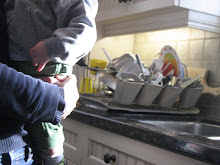I haven't been here in awhile. Somehow, my brain stopped looking for feminist/mom-related news stories over the winter. But I came back for a visit, after lunch today, and thought I'd like to check in more often.
Here's a link to an article on the politics of breastfeeding by Hannah Rosen, published in the The Atlantic, and suggested by a reader (whose comment I only saw today ... apparently the comment settings on this blog needed tweaking; consider them tweaked).
The article is controversial; but I did not respond quite like I'd anticipated. The article argues against "lactivists" and the popular medical advice given to women that breast is best. (Note: I do actually believe that breast is best). Ms. Rosen is a breastfeeding mother of three who began to investigate her own ambivalence about breastfeeding when her third child was newly born: and she walked right into a minefield that pits mothers against mothers.
Now, despite being a breastfeeding mother of four, I find sympathy with her argument. I chose breastfeeding because I wanted to breastfeed. I took a lot of pleasure from the experience. If my husband had been the one with the breasts, I would have been devastated. Lactating was an extremely powerful experience in my life. But I recognize that this is not the case for every woman. And I also recognize that breastfeeding is a major time-sucker (literally!). Because babies breastfeed through the night, I spent a good portion of my breastfeeding days sleep-deprived. My husband was pretty tired, too; we shared the night-time burden in the early infant days--I would nurse, and he would change the diaper or fetch the baby, if the baby had moved on to sleeping in another room. But I was the one whose body was working to make the milk. I was the one with the non-negotiable job--and it never felt like a sacrifice to me.
Neither did pregnancy. Definitely not birth. Those were formative life experiences that brought me strength. But, as my fourth child ends his nursing career, slowly, and I end my career as a lactating woman (and I've done the math--I've breastfed babies for a total of SEVEN YEARS), I get that other perspective: that desire to share the burden of childcare more fairly between partners. Breastfeeding can factor into that inequity.
Here's one more thought, though. Rather than wishing our bodies were different, is there some way to recognize and incorporate the realities of our bodies into the world of work and life? Only women can bear children. Only women can lactate. Whether you see this is a burden and a sacrifice, or a privilege and a joy, or perhaps as both, depends on a whole lot of factors, and may even change from day to day, or child to child. Breastfeeding out of obligation and with a strong sense of sacrifice may not be the best for you or your child. Still, it's always easier to make choices when there is plenty of support for the harder choices; support, not pressure; and I don't think we have the balance yet.
In the final paragraph of her article, Ms. Rosen tries to analyze why, despite wanting to quit, she hasn't given up breastfeeding entirely: "Breast-feeding does not belong in the realm of facts and hard numbers; it is much too intimate and elemental. It contains all of my awe about motherhood, and also my ambivalence."
I like that. How well I relate to that honest take on motherhood: awe and ambivalence.
I have a piece in Senses of Cinema
6 years ago


Carrie - I recently bought The Mommy Myth book. Do you have a copy of it? You can borrow it if you like.
ReplyDeletetricia
Have you read it? Did you enjoy it?
ReplyDeleteI am working my way through Wolf Hall right now, and it's massive, so I can't add to my bedside reading ... maybe in a few weeks!